Cecily Wolfe's Blog: The Start of Something New - Posts Tagged "relationships"
The Things We Need to Say by Rachel Burton - Publication Day!
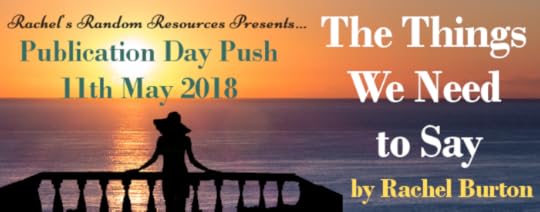
I am happy to be a part of the publication day blog tour for Rachel Burton's The Things We Need to Say. I just finished reading this lovely story this morning, so I'll start off with my review here on Goodreads:
What an incredible and emotional story!
The sensitive and deeply personal subjects the author tackles in this intense story are managed with great care, as is the writing itself, which creates believable characters who are realistically flawed in an unpredictable, sad but ultimately hopeful journey. This had me thinking about how easy it is to lose focus on what is important, and how vital it is to maintain an awareness of priorities. Highly recommended.
What is The Things We Need to Say about?
Sometimes the things we never say are the most important.
Fran loves Will with all her heart. They had a whirlwind romance, a perfect marriage and a wonderful life. Until everything changed. Now Fran needs to find her way again and teaching a yoga retreat in Spain offers her just that. Leaving behind a broken marriage she has some very important decisions to make.
Will needs his wife, he needs her to open up to him if they’re to ever return to the ways things once were. But he may have damaged any possibility he had of mending their relationship and now Fran is in Spain and Will is alone.
As both Fran and Will begin to let go of a life that could have been, fate may just find a way of bringing them back together.
Perfect for fans of Katie Marsh, Amanda Prowse and Sheila O’Flanagan
Purchase on Amazon UK - http://amzn.to/2kLqSYL
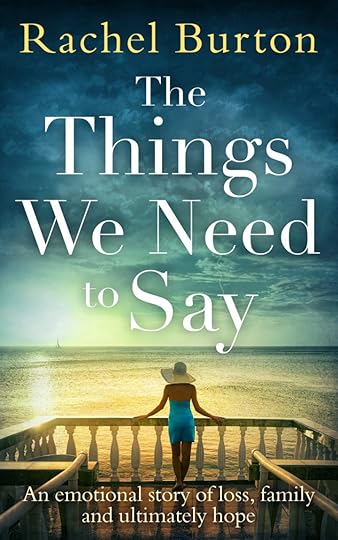
Author Bio
Rachel Burton has been making up stories since she first learned to talk. After many false starts she finally made one up that was worth writing down.
After graduating with a degree in Classics and another in English, she didn't really know what to do when she grew up. She has worked as a waitress, a paralegal and a yoga teacher.
She has spent most of her life between Cambridge and London but now lives in Leeds with her boyfriend and three cats. The main loves of her life are The Beatles and very tall romantic heroes.
Her debut, The Many Colours of Us, was an Amazon Kindle bestseller. Her second novel, The Things We Need to to Say, is released on 11 May 2018. She is currently working on her third novel in which the heroine follows the love of her life to live in a city in northern England. It has no autobiographical elements at all . . . maybe.
Find her on Twitter & Instagram as @bookish_yogi or search Facebook for Rachel Burton Author. She is always happy to talk books, writing, music, cats and how the weather in Yorkshire is rubbish. She is mostly dreaming of her next holiday . . .
Facebook - https://www.facebook.com/rachelburton...
Twitter - https://twitter.com/bookish_yogi
Instagram - https://www.instagram.com/bookish_yogi/

Published on May 11, 2018 07:12
•
Tags:
crisis, rachel-burton, reconciliation, relationships, release-day, review, romance, women-s-fiction, yoga
When Daronte's Father Went to Prison - In the Margins Blog Tour
Come with us as we reveal the long-awaited interview of author Kim Ballou, author of When Daronte's Father Went to Prison as part of the In the Margins blog tour this month.
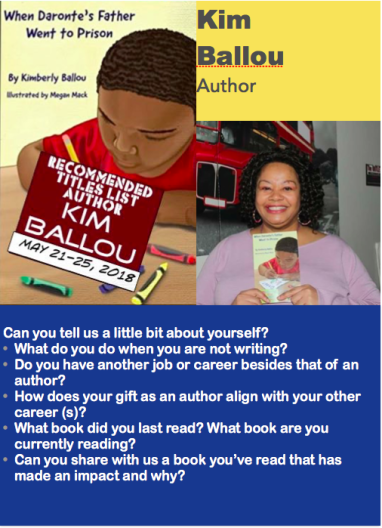
KB: When I'm not writing, I'm usually reading! I also enjoy nature walks—I'm a biology geek, and what better way is there to see biology in action?
My other career is an educator.I'm a former fourth-grade teacher, and now I create practice questions and answer explanations for an online learning bank. I love teaching in all its different forms and my writing reflects it. I hope everyone gains a new perspective from some aspect of my writing.
I use my writing to bring up elements that readers may not have considered—for example, many people wouldn't think that a drug dealer could possibly be a decent parent. As an educator, I want people to think critically about situations and ask questions rather than being "spoon-fed" information. What makes someone a good parent? Can a person break the law and still be a good parent? Is it acceptable for a child to love a parent who has made some really bad decisions? How can we, as a society, give the child space to love his or her parent, while still condemning the parent's behavior? These are the deeper questions I would love for people to address.

ITM: What were some of your earliest memories of writing that you enjoyed?
KB: I've been an avid writer since I was a young child. After acting onstage for several years, I wrote my first play when I was nine years old. It was a Christmas play about a family's adventures preparing for the holiday season, and it featured many of the "standard" children's Christmas songs, like "Rudolph the Red-Nosed Reindeer" and "Frosty the Snowman." It was cute, and I was SO proud!
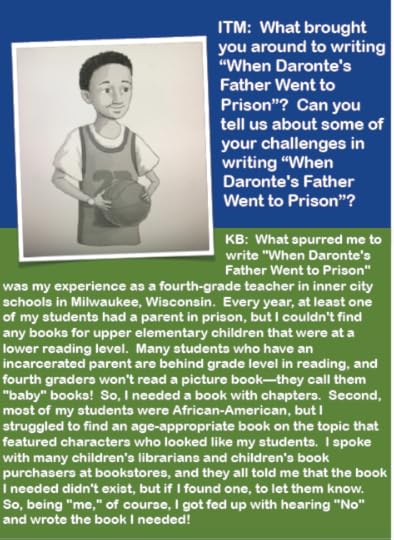
ITM: What brought you around to writing When Daronte's Father Went to Prison? Can you tell us about some of your challenges in writing When Daronte's Father Went to Prison?
KB: What spurred me to write When Daronte's Father Went to Prison was my experience as a fourth-grade teacher in inner city schools in Milwaukee, Wisconsin.
"Every year, at least one of my students Screen Shot 2018-05-21 at 11.52.35 AMhad a parent in prison, but I couldn't find any books for upper elementary children that were at a lower reading level."
Many students who have an incarcerated parent are behind grade level in reading, and fourth graders won't read a picture book—they call them "baby" books! So, I needed a book with chapters.
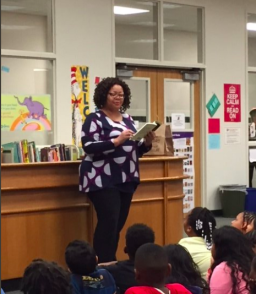
"Second, most of my students were African-American, but I struggled to find an age-appropriate book on the topic that featured characters who looked like my students."
I spoke with many children's librarians and children's book purchasers at bookstores, and they all told me that the book I needed didn't exist, but if I found one, to let them know. So, being "me," of course, I got fed up with hearing "No" and wrote the book I needed!
ITM: How did you determine the storyline? What was your process? Did you have to make an outline or are do you just write?
KB: I knew I wanted the book to have some positive messages without being "preachy." I used information given to me by my student—like the raid scene—for many of the key details in the book. I "fleshed out" some of the descriptions by drawing upon my own experience growing up in Gary, Indiana, walking past drug houses every day to get to school. I wanted my characters to seem like real, normal people rather than saints or monsters. Finally, I knew that Daronte needed a journey, something that changed him and made him grow. How Daronte came to accept and forgive his father's crime provided the reason for that journey. As I mentioned, I've been an actress since I was six years old—I'm very familiar with the way a story needs to "travel" from a starting point to the end of the road (story). I put ALL these elements together and just started writing. I ended up with the first draft of my book. Then, after 6,237 (ish) revisions and read-throughs, When Daronte's Father Went to Prison was ready to be published!
ITM: One of the most impactful frameworks that undergird your storyline is the middle-class lifestyle of Daronte and his family. What inspired you to present Daronte as middle class? What did you know of the consequences suffered by Daronte and children like him? How are middle-class youth different or similar to youth that experiences the same thing but are from lower income levels? In your experience, what have you seeded the most of from children who experience this trauma: middle-class youth? Lower-income youth?
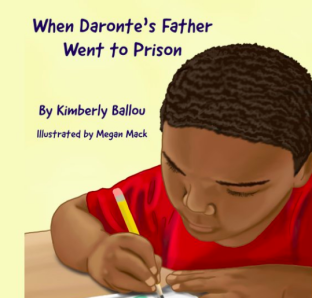
KB: I have met drug dealers personally—some were my students' parents, and others were people I knew when I was growing up in Gary. Many of them lived what's now called a "Bad and Bougie" lifestyle: one in which their roots and their income remain based on the street lifestyle, but the face they present to the world can be middle-class. Daronte didn't know a street life, but in their backstory, his parents were low-income people who lived a street life until drug money raised their socioeconomic status.
"In this way, the difference between low-income and middle-class is not a true distinction—this particular group straddles the line between them. "
My experience of the consequences to the children who experience this trauma involves children who inhabit this "shadow" world, and once the money is gone, they suffer the xsame poverty and instability as any other low-income youth.
ITM: The other impactful framework undergirding your storyline is the phenomenon of young black boys having guns pulled on themselves by authority figures. How bad is this affecting communities in the areas you teach? In the schools in the area? Do you see this phenomenon occurring with different ethnic groups?
KB: When I was a teenager and began going out with my friends, my mother told me what to do in case we were stopped by the police: hands visible, don't run, speak respectfully, and move slowly. That's what it was like when I was a TEENAGER—the youngest child who told me about a raid at his house was five years old. And yes, he said the officers pointed their guns at him. Don't misunderstand me: police officers have a tough, dangerous job, and I've worked with wonderful officers of different ethnicities who try hard to make a positive difference in the communities they protect.
"But pointing a semi-automatic weapon at a five-year-old can never be acceptable. Where's the imminent threat?"
My students who experienced this type of behavior by the police just felt increased animosity toward and distrust of police officers. How do you convince a nine-year-old to trust officers when a group of them burst into his home and pointed a gun at him? To a nine-year-old, those officers represent ALL officers at all times, and there is no way to erase that deep impression on one so young.

ITM: What was your favorite chapter (or part) of the When Daronte's Father Went to Prison storyline and why?
KB: My favorite chapter to write was Chapter Two because it challenged me to express all the emotions that my students felt during their terrifying experiences! My favorite part to read is in Chapter Six when Daronte is dealing with the nosy neighbor, Mrs. Carr. I think everyone knows someone like Mrs. Carr—she cracks me up!
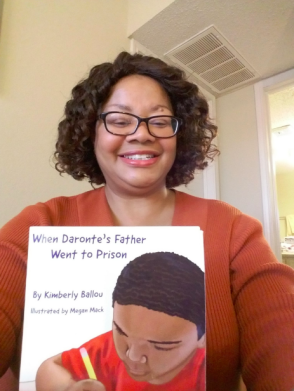
ITM: What has been the toughest criticism given to you as an author? What has been the best compliment?
KB: After all the proofreading, read-throughs and editing I had done, a reader noticed a mistake. It hurt my little perfectionist's heart! The biggest compliment happened when I conducted a little experiment at an airport. A young African-American boy, about 11 years old, sat across from me, listening to music on headphones and playing games on an iPad. He was dancing along to the music while in his seat. I pulled out a copy of When Daronte's Father Went to Prison and held it up, pretending to read while watching him. He eventually glanced around, noticed the book's cover and did a double-take! He then leaned all the way over in his chair to read the title. His reaction has been my best compliment so far. He had to board the plane before we could chat, but this experiment drove home to me the need for African-American children to see themselves represented in books. It should be a normal occurrence rather than something that causes a double-take.
ITM: Do you have any advice to give to aspiring writers?
KB: I say to aspiring writers, "Keep perfecting your craft." It's not enough to write your ideas—you need feedback from other writers to improve. Join local writing groups and workshops. Learn how to accept criticism of your work and use the feedback to make your craft better. Writing is a marathon, not a sprint.
ITM: Are you working on a new book title? Can you share with us what the title is and when it will be due?
KB: I am currently working on my second middle-grade book, tentatively titled, "Aniyah and the Albatross." It is due out in November 2018.
KB: Is there anything that you would like to say to your readers and fans?
ITM: Everyone, please be on the lookout for my author website, coming soon. You'll find pictures and links to interviews, as well as blog posts and other extras for parents and educators. Thank you all so much for buying and supporting When Daronte's Father Went to Prison You can find it on Amazon.com. I hope it makes you laugh, makes you think, and helps children see that no matter how bad things are, there's always hope!
Follow Kimberly Ballou on Amazon: https://amzn.to/2KLJH5F
LinkedIn: https://bit.ly/2LlQp3E
Facebook: https://bit.ly/2GGLxSX

KB: When I'm not writing, I'm usually reading! I also enjoy nature walks—I'm a biology geek, and what better way is there to see biology in action?
My other career is an educator.I'm a former fourth-grade teacher, and now I create practice questions and answer explanations for an online learning bank. I love teaching in all its different forms and my writing reflects it. I hope everyone gains a new perspective from some aspect of my writing.
I use my writing to bring up elements that readers may not have considered—for example, many people wouldn't think that a drug dealer could possibly be a decent parent. As an educator, I want people to think critically about situations and ask questions rather than being "spoon-fed" information. What makes someone a good parent? Can a person break the law and still be a good parent? Is it acceptable for a child to love a parent who has made some really bad decisions? How can we, as a society, give the child space to love his or her parent, while still condemning the parent's behavior? These are the deeper questions I would love for people to address.

ITM: What were some of your earliest memories of writing that you enjoyed?
KB: I've been an avid writer since I was a young child. After acting onstage for several years, I wrote my first play when I was nine years old. It was a Christmas play about a family's adventures preparing for the holiday season, and it featured many of the "standard" children's Christmas songs, like "Rudolph the Red-Nosed Reindeer" and "Frosty the Snowman." It was cute, and I was SO proud!

ITM: What brought you around to writing When Daronte's Father Went to Prison? Can you tell us about some of your challenges in writing When Daronte's Father Went to Prison?
KB: What spurred me to write When Daronte's Father Went to Prison was my experience as a fourth-grade teacher in inner city schools in Milwaukee, Wisconsin.
"Every year, at least one of my students Screen Shot 2018-05-21 at 11.52.35 AMhad a parent in prison, but I couldn't find any books for upper elementary children that were at a lower reading level."
Many students who have an incarcerated parent are behind grade level in reading, and fourth graders won't read a picture book—they call them "baby" books! So, I needed a book with chapters.

"Second, most of my students were African-American, but I struggled to find an age-appropriate book on the topic that featured characters who looked like my students."
I spoke with many children's librarians and children's book purchasers at bookstores, and they all told me that the book I needed didn't exist, but if I found one, to let them know. So, being "me," of course, I got fed up with hearing "No" and wrote the book I needed!
ITM: How did you determine the storyline? What was your process? Did you have to make an outline or are do you just write?
KB: I knew I wanted the book to have some positive messages without being "preachy." I used information given to me by my student—like the raid scene—for many of the key details in the book. I "fleshed out" some of the descriptions by drawing upon my own experience growing up in Gary, Indiana, walking past drug houses every day to get to school. I wanted my characters to seem like real, normal people rather than saints or monsters. Finally, I knew that Daronte needed a journey, something that changed him and made him grow. How Daronte came to accept and forgive his father's crime provided the reason for that journey. As I mentioned, I've been an actress since I was six years old—I'm very familiar with the way a story needs to "travel" from a starting point to the end of the road (story). I put ALL these elements together and just started writing. I ended up with the first draft of my book. Then, after 6,237 (ish) revisions and read-throughs, When Daronte's Father Went to Prison was ready to be published!
ITM: One of the most impactful frameworks that undergird your storyline is the middle-class lifestyle of Daronte and his family. What inspired you to present Daronte as middle class? What did you know of the consequences suffered by Daronte and children like him? How are middle-class youth different or similar to youth that experiences the same thing but are from lower income levels? In your experience, what have you seeded the most of from children who experience this trauma: middle-class youth? Lower-income youth?

KB: I have met drug dealers personally—some were my students' parents, and others were people I knew when I was growing up in Gary. Many of them lived what's now called a "Bad and Bougie" lifestyle: one in which their roots and their income remain based on the street lifestyle, but the face they present to the world can be middle-class. Daronte didn't know a street life, but in their backstory, his parents were low-income people who lived a street life until drug money raised their socioeconomic status.
"In this way, the difference between low-income and middle-class is not a true distinction—this particular group straddles the line between them. "
My experience of the consequences to the children who experience this trauma involves children who inhabit this "shadow" world, and once the money is gone, they suffer the xsame poverty and instability as any other low-income youth.
ITM: The other impactful framework undergirding your storyline is the phenomenon of young black boys having guns pulled on themselves by authority figures. How bad is this affecting communities in the areas you teach? In the schools in the area? Do you see this phenomenon occurring with different ethnic groups?
KB: When I was a teenager and began going out with my friends, my mother told me what to do in case we were stopped by the police: hands visible, don't run, speak respectfully, and move slowly. That's what it was like when I was a TEENAGER—the youngest child who told me about a raid at his house was five years old. And yes, he said the officers pointed their guns at him. Don't misunderstand me: police officers have a tough, dangerous job, and I've worked with wonderful officers of different ethnicities who try hard to make a positive difference in the communities they protect.
"But pointing a semi-automatic weapon at a five-year-old can never be acceptable. Where's the imminent threat?"
My students who experienced this type of behavior by the police just felt increased animosity toward and distrust of police officers. How do you convince a nine-year-old to trust officers when a group of them burst into his home and pointed a gun at him? To a nine-year-old, those officers represent ALL officers at all times, and there is no way to erase that deep impression on one so young.

ITM: What was your favorite chapter (or part) of the When Daronte's Father Went to Prison storyline and why?
KB: My favorite chapter to write was Chapter Two because it challenged me to express all the emotions that my students felt during their terrifying experiences! My favorite part to read is in Chapter Six when Daronte is dealing with the nosy neighbor, Mrs. Carr. I think everyone knows someone like Mrs. Carr—she cracks me up!

ITM: What has been the toughest criticism given to you as an author? What has been the best compliment?
KB: After all the proofreading, read-throughs and editing I had done, a reader noticed a mistake. It hurt my little perfectionist's heart! The biggest compliment happened when I conducted a little experiment at an airport. A young African-American boy, about 11 years old, sat across from me, listening to music on headphones and playing games on an iPad. He was dancing along to the music while in his seat. I pulled out a copy of When Daronte's Father Went to Prison and held it up, pretending to read while watching him. He eventually glanced around, noticed the book's cover and did a double-take! He then leaned all the way over in his chair to read the title. His reaction has been my best compliment so far. He had to board the plane before we could chat, but this experiment drove home to me the need for African-American children to see themselves represented in books. It should be a normal occurrence rather than something that causes a double-take.
ITM: Do you have any advice to give to aspiring writers?
KB: I say to aspiring writers, "Keep perfecting your craft." It's not enough to write your ideas—you need feedback from other writers to improve. Join local writing groups and workshops. Learn how to accept criticism of your work and use the feedback to make your craft better. Writing is a marathon, not a sprint.
ITM: Are you working on a new book title? Can you share with us what the title is and when it will be due?
KB: I am currently working on my second middle-grade book, tentatively titled, "Aniyah and the Albatross." It is due out in November 2018.
KB: Is there anything that you would like to say to your readers and fans?
ITM: Everyone, please be on the lookout for my author website, coming soon. You'll find pictures and links to interviews, as well as blog posts and other extras for parents and educators. Thank you all so much for buying and supporting When Daronte's Father Went to Prison You can find it on Amazon.com. I hope it makes you laugh, makes you think, and helps children see that no matter how bad things are, there's always hope!
Follow Kimberly Ballou on Amazon: https://amzn.to/2KLJH5F
LinkedIn: https://bit.ly/2LlQp3E
Facebook: https://bit.ly/2GGLxSX
Published on May 24, 2018 03:31
•
Tags:
book-awards, children, families, in-the-margins, itm, kidlit, marginalization, picture-books, prison, relationships



